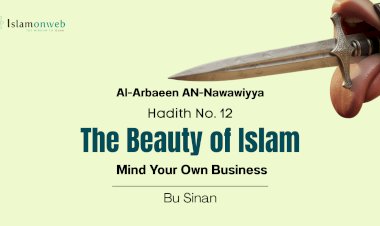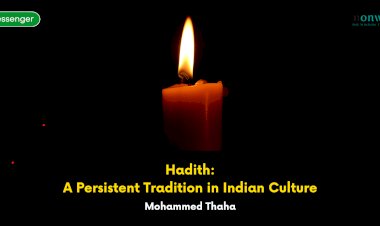Ethical Dimensions of the Prophet’s Life and Teachings
The word "ethics" is derived from the Greek word ethos, meaning "character" or "custom." It encompasses human actions, behaviour, reasoning, and culture, which together form the moral systems governing societies. In Arabic, ethics is referred to by several terms, including ma’ruf (approved), khayr (goodness), haqq (truth and right), birr (righteousness), qist (equity), ‘adl (justice), and taqwa (piety). Collectively, these terms describe the attributes that define an advanced society where culture, science, industry, and governance flourish.
The most common Arabic term for ethics is akhlaq, the singular of which is khulq. Another closely related term is adab (manner). While some scholars consider the two synonymous, important differences exist: akhlaq refers to the internal moral character that influences actions, while adab pertains to the actual practice of those morals.
Using Hadith as a source for ethics highlights the richness of ethical content embedded within the Prophetic traditions. This can be analysed at two levels. First, the Prophetic Sunnah can be viewed as a revealed reference, exemplifying how revelation is applied in practice. Second, it can be seen as a historical reference, reflecting the ethical standards that shaped the early period of Islamic history.
In Islamic history, a crucial position has been that the classification of actions as good (tahsin) or bad (taqbih) must be based on divine revelation rather than human reasoning, as argued by the Muʿtazila. Accordingly, both the Qur’an and Hadith should serve as sources of legislation and ethics. However, historical developments reveal that while this principle is well-established in Islamic legal theory (usul-ul-fiqh) and jurisprudence (fiqh), it has not been as prominent in Islamic ethics. In classical Islamic moral philosophy, the role of Hadith and the Sunnah, like that of the Qur’an, has often been marginalised.
Notably, Majid Fakhry (d. 2021), in his work Ethical Theories in Islam, and Muḥammad Abid al-Jabiri (d. 2010), in al-‘Aql al-Akhlaq al-‘Arab ("The Arabic Moral Reason"), both claim to provide comprehensive overviews of Islamic ethical literature. However, as reflected in their works, Hadith plays a minimal role in their discussions of ethics within the Islamic tradition.
Unlike theoretical ethics, the practical and behavioural aspects of Prophetic hadith have garnered significant attention from hadith scholars. These scholars have developed a vast body of literature focusing on the ethical dimensions of the Sunnah. A substantial portion of this literature is dedicated to adab (etiquette and good manners), addressing not only general conduct but also professional ethics. Examples include the adab of narrators and listeners of hadith (adab al-rawi wal-mustami) and the adab of senior and junior jurists (adab al-faqih wal-muta'faqih).
Furthermore, various works have been compiled to outline good and bad character traits (mahasin al-akhlaq wal-masawiyah), religious etiquettes (al-adab al-shar'iyya), and proper treatment of parents (birr al-walidayn). Other works focus on virtues and vices (al-fadail wal-radha’il), incentives for good deeds (targhib), deterrents from evil (tarhib), and the branches of faith (shu'ab al-iman). Additionally, Sufi literature delves into asceticism (zuhd), remembrance of God, supplication (adab al-du'a), and the spiritual ailments of the heart ('ilal al-qulub), among other topics.
In summary, morality and ethics are foundational principles that shape human behaviour and interactions, forming the moral backbone of societies worldwide. In Islam, the Hadith literature provides a rich repository of ethical teachings, offering Muslims guidance on how to lead virtuous and righteous lives. These sayings and actions of the Prophet Muhammad (PBUH) form a comprehensive framework for understanding and practising morality in all aspects of life.
Core Ethical and Moral Principles in Hadith Literature
Hadith literature, comprising the sayings and actions of the Prophet Muhammad (PBUH), is a cornerstone of ethical and moral guidance for Muslims around the world. Embedded within these sacred texts are core ethical principles that illuminate the path to righteousness and virtuous living. The teachings in Hadith provide a comprehensive framework for navigating moral dilemmas, fostering compassion, promoting justice, and upholding integrity in all aspects of life.
1. Honesty
Honesty is a foundational virtue in Islam, emphasised by the Prophet Muhammad (PBUH) as a key element of ethical conduct. The Hadith literature is filled with teachings that highlight the importance of honesty, integrity, and truthfulness in every aspect of life. Through the Prophet's sayings and actions, Muslims are guided to uphold honesty as a core principle that governs their interactions with others and their relationship with Allah.
عَنِ ابْنِ مَسْعُودٍ , قَالَ: قَالَ رَسُولُ اللَّهِ ﷺ: عَلَيْكُمْ بِالصِّدْقِ، فَإِنَّ الصِّدْقَ يَهْدِي إِلَى الْبِرِّ، وإِنَّ الْبِرَّ يَهْدِي إِلَى الْجَنَّةِ، ومَا يَزَالُ الرَّجُلُ يَصْدُقُ ويَتَحَرَّى الصِّدْقَ حَتَّى يُكْتَبَ عِنْدَ اللَّهِ صِدِّيقًا، وإِيَّاكُمْ والْكَذِبَ، فَإِنَّ الْكَذِبَ يَهْدِي إِلَى الْفُجُورِ، وإِنَّ الْفُجُورَ يَهْدِي إِلَى النَّارِ، ومَا يَزَالُ الرَّجُلُ يَكْذِبُ ويَتَحَرَّى الْكَذِبَ حَتَّى يُكْتَبَ عِنْدَ اللَّهِ كَذَّابًا. مُتَّفَقٌ عَلَيْهِ.
The Hadith narrated by Ibn Mas'ud (may Allah be pleased with him) states:
“The Messenger of Allah (PBUH) said: ‘Be truthful, for truthfulness leads to righteousness, and righteousness leads to Paradise. A person continues to speak the truth and strive to be truthful until they are recorded with Allah as a truthful person. Beware of lying, for lying leads to immorality, and immorality leads to the Fire. A person continues to lie and strive to lie until they are recorded with Allah as a liar.’"
(Agreed upon by Bukhari and Muslim)
This Hadith emphasises the importance of truthfulness and the dangers of falsehood. The Prophet Muhammad (PBUH) instructs his followers to uphold honesty, as it leads to righteousness, which ultimately guides one to Paradise. It illustrates how a person who consistently speaks the truth will be recorded by Allah as a truthful person, a status of great virtue.
On the other hand, the Prophet (PBUH) warns against lying, as it leads to immorality and, eventually, to Hellfire. This Hadith highlights the detrimental effects of dishonesty, not only in this world but also in the Hereafter. A person who habitually lies is recorded by Allah as a liar, a label that reflects the person's moral corruption.
The Hadith serves as a powerful reminder of the moral and spiritual consequences of both honesty and dishonesty. It encourages believers to prioritise truthfulness in their words and actions, recognising honesty as a pathway to righteousness and divine favour. By following this teaching, Muslims are reminded of the profound significance of honesty in shaping their character and guiding them toward eternal salvation.
عن أبي هريرة رضي الله عنه, قال, قال رسول الله ﷺ"من كان يؤمن بالله واليوم الآخر فلا يؤذِ جاره، ومن كان يؤمن بالله واليوم الآخر فليكرمْ ضيفه، ومن كان يؤمن بالله واليوم الآخر فليقلْ خيراً أو ليصمت."
The Prophet Muhammad (PBUH) said:
"Whoever believes in Allah and the Last Day should not harm their neighbor; whoever believes in Allah and the Last Day should honor their guest; and whoever believes in Allah and the Last Day should speak good or remain silent."
(Reported by Abu Huraira, agreed upon by Bukhari and Muslim)
This Hadith highlights several key ethical principles in Islam. Firstly, it stresses the importance of not harming one’s neighbour, emphasising the value of peaceful and respectful coexistence. Secondly, it underscores the duty to honour guests, reflecting the importance of hospitality in Islam. Lastly, it encourages believers to either speak good or remain silent, stressing that communication should always be constructive and truthful.
The Hadith makes it clear that speaking noble and kind words is a form of communication that promotes goodness and positivity. It also serves as a reminder that Muslims are required to speak truthfully and avoid harmful speech, as lying or using hurtful words is contrary to the character of a true believer. Therefore, honesty is not just encouraged, but it is compulsory for a Muslim, as it is a fundamental aspect of faith and piety.
2. Kindness
Kindness is a fundamental aspect of Islamic teachings, as demonstrated in numerous Hadiths of the Prophet Muhammad (PBUH). The Prophet consistently emphasised the importance of showing kindness and compassion towards others, regardless of their background or beliefs. The Hadith literature provides profound wisdom and guidance that highlight the significance of kindness in Islam and its transformative impact on individuals and society.
One such Hadith states:
عن مالك بن الحويرث ـ رضي الله عنه ـ قال: ( أتيت النبي ـ صلى الله عليه وسلم ـ في نفر من قومي، فأقمنا عنده عشرين ليلة، وكان رحيما رفيقا ) رواه البخاري.
Malik bin Huwayrith (may Allah be pleased with him) said: "I came to the Prophet (PBUH) with a group of my people, and we stayed with him for twenty nights. He was kind and gentle towards us." (Narrated by Bukhari)
This Hadith underscores the kindness and compassion that the Prophet Muhammad (PBUH) showed to his guests. It illustrates the importance of hospitality, respect, and generosity in interacting with others. By following the Prophet’s example, Muslims are reminded to treat their guests and those around them with kindness and consideration.
Another Hadith reported by Aishah (may Allah be pleased with her) highlights the importance of kindness in parenting:
عن عائشة رضي الله عنها قالت: قدم ناس من الأعراب على رسول الله صلى الله عليه وسلم، فقالوا : أتقبلون صبيانكم؟ فقال: "نعم" قالوا: لكنا والله ما نقبل ! فقال رسول الله صلى الله عليه وسلم : "أو أملك إن كان الله نزع من قلوبكم الرحمة؟" ((متفق عليه))
Some bedouins came to the Messenger of Allah (PBUH) and asked: "Do you kiss your children?" He replied, "Yes." They said, "By Allah, we do not kiss them." The Prophet (PBUH) replied, "I cannot help you if Allah has snatched kindness from your hearts."
(Agreed upon by Bukhari and Muslim)
This Hadith reflects the essential role of kindness and affection in raising children. The Prophet Muhammad (PBUH) demonstrated that expressing love and compassion towards one’s children is a crucial aspect of parenting. Through this teaching, parents are encouraged to nurture values such as empathy, respect, and responsibility in their children so that they grow into well-rounded individuals who can contribute positively to society.
The Hadiths about kindness serve as powerful reminders of the significance of compassion in all aspects of life. They guide Muslims to emulate the Prophet's example by being kind to family members and others in society, fostering an atmosphere of love, respect, and understanding.
3. Justice
The teachings of the Prophet Muhammad (PBUH) provide profound insights into the importance of justice and fairness in all aspects of life. Hadiths, which document the sayings and actions of the Prophet, serve as a valuable source of guidance on how to uphold justice in society, relationships, and personal conduct.
قَالَ رَسُولُ اللَّهِ صَلَّى اللَّه عَلَيْهِ وَسَلَّمَ: (الظُّلْمُ ظُلُمَاتٌ يَومَ القِيَامَةِ). (رواه البخاري)
The Prophet (PBUH) said:
“Oppression will be darkness on the Day of Resurrection.”
(Sahih Bukhari)
This Hadith highlights the severe consequences of injustice and oppression, emphasising that those who engage in wrongdoing will face darkness and uncertainty on the Day of Judgment. It serves as a powerful reminder that justice must be upheld in all matters.
قَالَ رَسُولُ اللَّهِ صَلَّى اللَّه عَلَيْهِ وَسَلَّمَ: (من طلب قضاءَ المسلمين حتى ينالَه ثم غَلبَ عدلُه جَوْرَه، فله الجنَّة، ومن غلبَ جورُه عدْلَه فله النار) (رواه أبو داود)
In another Hadith, the Prophet (PBUH) said:
“Whoever seeks the judgment of Muslims and attains it, and then his justice outweighs his injustice, for him is Paradise. But if his injustice outweighs his justice, for him is Hellfire.”
(Reported by Abu Dawood)
This Hadith underscores the importance of fairness when holding positions of authority or judgment. It teaches that those who act justly will be rewarded with Paradise, while those who let injustice prevail will face punishment in the Hereafter.
قَالَ رَسُولُ اللَّهِ صَلَّى اللَّه عَلَيْهِ وَسَلَّمَ: (إنَّ المُقْسِطِينَ عِنْدَ اللهِ علَى مَنابِرَ مِن نُورٍ، عن يَمِينِ الرَّحْمَنِ عزَّ وجلَّ، وكِلْتا يَدَيْهِ يَمِينٌ، الَّذِينَ يَعْدِلُونَ في حُكْمِهِمْ وأَهْلِيهِمْ وما ولوا).[رواه مسلم]
The Prophet (PBUH) also said:
“Indeed, the just will be with Allah on pulpits of light—those who are fair in their rulings and with their families and in all that they undertake.”
(Sahih Muslim)
This Hadith further emphasises the honour and status given to those who are just and fair. It highlights that justice is not only required in public rulings but also in personal relationships and responsibilities. Those who maintain fairness in all aspects of their lives will be rewarded by Allah with a special place of distinction.
This emphasis on equality and mutual protection forms a cornerstone of Islamic teachings on justice and social responsibility. By recognising the equal rights and dignity of all individuals within the Muslim community, these Hadiths illustrate the importance of upholding justice, compassion, and solidarity in all aspects of life.
4. Respect for others
Respect for others is a fundamental principle in Islam, emphasised in numerous Hadiths of the Prophet Muhammad (PBUH). These teachings highlight the importance of treating all individuals with kindness, compassion, and dignity, regardless of their background, beliefs, or social status. The Prophet's words and actions serve as a guide for Muslims to cultivate a culture of respect, understanding, and empathy in their interactions and relationships.
In Islamic tradition, respect for others is not limited to fellow Muslims but extends to all human beings. Islam views respect as an inherent right of all people. As Almighty Allah said in the Qur'an:
"وَلَقَدْ كَرَّمْنَا بَنِي آدَمَ وَحَمَلْنَاهُمْ فِي الْبَرِّ وَالْبَحْرِ وَرَزَقْنَاهُمْ مِنَ الطَّيِّبَاتِ وَفَضَّلْنَاهُمْ عَلَىٰ كَثِيرٍ مِّمَّنْ خَلَقْنَا تَفْضِيلًا"
"We have indeed honored the children of Adam, and provided for them means of transportation on land and sea, and given them wholesome food, and exalted them high above many of Our creation."
(Surah Al-Isra, 17:70)
By exploring the Hadiths that emphasise respect for others, we gain insight into the ethical principles that underpin Islamic teachings on interpersonal relationships and social conduct. These teachings inspire Muslims to cultivate a spirit of tolerance, empathy, and respect towards all individuals, fostering unity and solidarity within the community.
In a Hadith, it is reported:
حديث عمرو بن شعيب عن أبيه عن جده قال: قال رسول الله ﷺ: ليس منا من لم يرحم صغيرنا، ويعرف شرف كبيرنا
“That person is not one of us who is not merciful to our youngsters and respectful to our elders.”
(Sahih Hadith, reported by Abu Dawood and Tirmidhi)
This beautiful Hadith reflects the values of compassion and respect in Islam. The Prophet Muhammad (PBUH) encourages us to be compassionate towards the youth and respectful to the elderly. Showing empathy for the young and honouring the old are fundamental values that promote unity and peaceful coexistence within society.
The Relevance of Prophetic Ethics in Modern Times
In today's world, where moral values seem to be declining, the teachings of Hadith literature provide a much-needed moral compass for individuals striving to live a virtuous and ethical life. One of the central teachings of Hadith literature is the importance of honesty and integrity in all aspects of life. As the Prophet Muhammad (PBUH) said:
"The one who believes in Allah and the Last Day should speak good or remain silent."
(Sunan Ibn Majah)
The Prophet emphasised the significance of truthfulness and sincerity in interactions with others. He taught that lying and deceit not only harm individuals but are also detrimental to society as a whole. In a world where dishonesty and corruption are widespread, the teachings of the Prophet on honesty serve as a powerful reminder for Muslims to uphold their moral values and act with integrity in their daily lives.
The Hadiths also highlight the importance of compassion and kindness toward others. The Prophet Muhammad (PBUH) was known for his kind and empathetic nature, and he encouraged his followers to show mercy and compassion to all beings, regardless of their background or beliefs. In a world where division and hatred seem to be increasing, the teachings of the Prophet on compassion inspire individuals to cultivate empathy and understanding, fostering harmony and unity within society.
Additionally, Hadith literature provides valuable guidance on the concepts of justice and fairness. The Prophet Muhammad (PBUH) emphasised the need for individuals to treat others justly and equitably, regardless of social status or background. He taught that justice is a fundamental principle that should guide all aspects of human interaction, from personal relationships to governance. In a world plagued by injustices and inequalities, the teachings of the Prophet on justice encourage individuals to work towards creating a more just and equitable society for all.
In conclusion, the teachings on ethics and morality found in Hadith literature are as relevant today as they were during the time of the Prophet Muhammad (PBUH). In a world increasingly marked by greed, dishonesty, and injustice, the Prophet's teachings offer a timeless guide for Muslims seeking to live in accordance with ethical principles. By adhering to the teachings of the Prophet on honesty, compassion, and justice, individuals can contribute to building a more virtuous and ethical society firmly grounded in the values of Islam.
REFERENCES
- Abdulqadir Sulaiman Muhammed, PhD and Sheikh Abduraheem Sunusi, PhD. An Islamic Perspective on Morality and Ethics for Sustainable Development.
- Imam Bukhari. Al-Adabul Mufrad.
- "Criticism in Hadith," Wikipedia.
- Jamal A. Badawi, Ph.D. Gender Equity in Islam.
- Mutaz al-Khatib. Ḥadīth and Ethics.
- Dina El Omari. Hadith and Gender.
- Muya Syaroh Iwanda Lubis and Nurhayati. Hadith Related to the Ethics of Honest and Responsible Communication.
- Mansoureh Ebrahimi, PhD, and Kamaruzaman Yusoff, PhD. Islamic Identity, Ethical Principles and Human Values. Senior Lecturer and Professor at Faculty of Islamic Civilization, Universiti Teknologi Malaysia.
- Amira Mashhour. Islamic Law and Gender Equality: Could There Be a Common Ground?: A Study of Divorce and Polygamy in Sharia Law and Contemporary Legislation in Tunisia and Egypt.
- Ignác Goldziher. Muslim Studies.
- Shamrahayu Aziz. Right to Equality and Justice under International Islamic Instruments and the Shari‛ah: An Evaluation.
- Umar Muhammad Noor. The Revival of Hadith Study in Modern Time.
- Anvar Ali Hudawi. Vajanaporul Samskaranathinte Nabimoyikal.
About the Author:
Sayyaf Pukayoor is a student at Shamsul Huda Islamic Academy, Kuttikkattoor, affiliated with Darul Huda Islamic University, Chemmad. He is currently pursuing his studies in the Department of Civilizational Studies.
Disclaimer
The views expressed in this article are the author’s own and do not necessarily mirror Islamonweb’s editorial stance.
























Leave A Comment